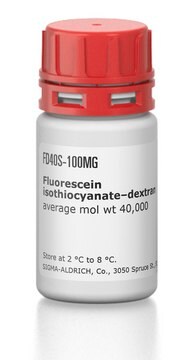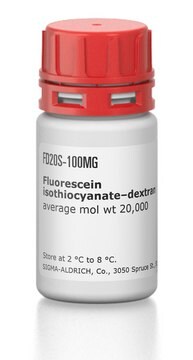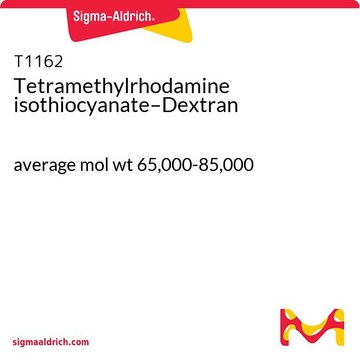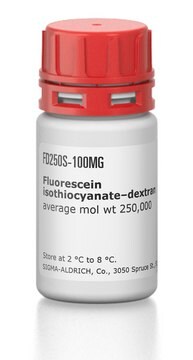FD70
Fluorescein isothiocyanate–dextran
average Mw 59,000-77,000
Synonym(s):
FITC–Dextran
About This Item
Recommended Products
biological source
bacterial (Leuconostoc mesenteroides)
Quality Level
conjugate
FITC conjugate
form
powder
mol wt
average Mw 59,000-77,000
extent of labeling
0.001-0.020 mol FITC per mol glucose
color
light yellow to dark orange
solubility
water: 25 mg/mL
storage temp.
2-8°C
Looking for similar products? Visit Product Comparison Guide
General description
Application
Packaging
Preparation Note
Other Notes
Signal Word
Warning
Hazard Statements
Precautionary Statements
Hazard Classifications
Eye Irrit. 2 - Skin Irrit. 2 - STOT SE 3
Target Organs
Respiratory system
Storage Class Code
11 - Combustible Solids
WGK
WGK 3
Flash Point(F)
Not applicable
Flash Point(C)
Not applicable
Personal Protective Equipment
Choose from one of the most recent versions:
Already Own This Product?
Find documentation for the products that you have recently purchased in the Document Library.
Customers Also Viewed
Articles
Additional information about FITC-labelled polysaccarides including FITC-Dextran, FITC-DEAE-dextran (FDD), FITC-carboxymethyl-dextran (FCM-Dextran). This page discusses the impact of weight-average molecular weight on the respective molecule dimensions and other physical properties
Related Content
Dextran is a polymer of anhydroglucose. It is composed of approximately 95% alpha-D-(166) linkages. The remaining (163) linkages account for the branching of dextran.
Our team of scientists has experience in all areas of research including Life Science, Material Science, Chemical Synthesis, Chromatography, Analytical and many others.
Contact Technical Service











